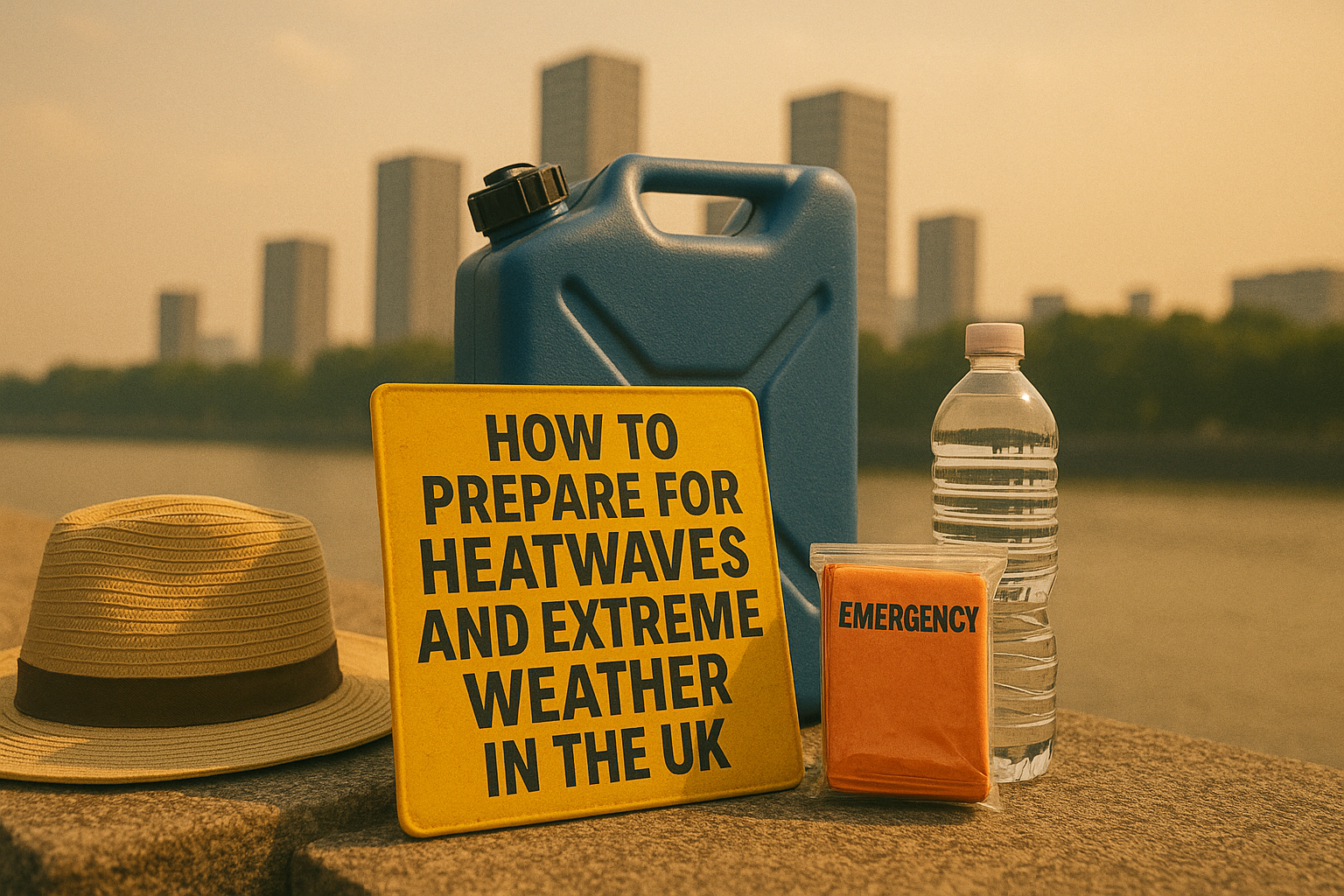How to Prepare for Heatwaves and Extreme Weather in the UK

Why Prepare for Heatwaves and Severe Weather in the UK?
With UK heatwaves and unpredictable storms becoming more frequent, it’s essential to be prepared. Extreme temperatures, heavy rain, and sudden weather shifts can threaten your health, home, and daily life. This guide will show you how to stay safe, comfortable, and resilient—whatever the UK weather brings.
Quick Facts: UK Heatwaves & Extreme Weather
| Statistic | Fact |
|---|---|
| Hottest day on record (UK) | 40.3°C (July 2022) |
| Heatwave duration | 3+ days of 25°C+ (definition for England) |
| Flood risk areas | 1 in 6 UK homes at risk |
| Common threats | Heatstroke, floods, power outages, fires |
Tip: Save this guide or print it out—don’t rely only on the internet during emergencies!
Understanding Heatwaves in the UK
A UK heatwave means several days of unusually high temperatures (often over 30°C), which can cause health risks and impact infrastructure.
Main Dangers of Heatwaves
- Heatstroke and dehydration, especially for children and older adults
- Sunburn and increased risk of skin damage
- Disrupted travel and power failures
- Fires and poor air quality
Essential Steps to Prepare Your Home for Heatwaves
Home Preparation Checklist
- Check and improve your home insulation to keep heat out
- Install blackout blinds or reflective window film
- Use fans or air conditioning if available
- Open windows for ventilation late at night or early morning
- Keep curtains or blinds closed during peak heat
How to Stay Safe and Cool During a UK Heatwave
| Safety Action | Why It Matters |
|---|---|
| Drink water regularly | Prevents dehydration |
| Wear light, loose clothes | Helps your body cool naturally |
| Use SPF 30+ sunscreen | Protects against sunburn and skin damage |
| Stay indoors 11am–3pm | Avoids peak sun and hottest hours |
| Never leave pets in cars | Car temps rise dangerously fast |
How to Build Your UK Extreme Weather Emergency Kit
Pack your kit in advance. Keep it somewhere easy to grab in a hurry.
- Water: At least 2 litres per person per day, for 3 days
- Non-perishable food: Energy bars, canned goods, dried fruit
- Battery torch & spare batteries
- First aid kit and basic medicines
- Charged power bank for mobile phones
- Copies of important documents in a waterproof pouch
- Wet wipes and hand sanitiser
- Cool packs or damp towels
- Radio (battery or wind-up) for emergency updates
Protecting Your Property from Storms and Floods
| Action | Details / Why |
|---|---|
| Check your roof & gutters | Prevents leaks and water damage |
| Store garden furniture | Stops wind from causing damage |
| Trim nearby trees | Avoids falling branches in storms |
| Use sandbags if needed | Protects against minor flooding |
| Raise valuables | Keep electronics & documents off floors |
Staying Informed: Weather Alerts in the UK
- Sign up for Met Office weather warnings: metoffice.gov.uk/weather/warnings-and-advice
- Download a weather alert app (e.g., Met Office Weather, BBC Weather)
- Follow trusted sources on social media for real-time updates
- Have a list of emergency contacts saved on paper and your phone
What to Do During Extreme Weather Events
During a Heatwave
- Stay indoors or in the shade during peak sun hours
- Take cool showers or use damp cloths to lower body temperature
- Watch out for signs of heatstroke: confusion, headache, dizziness, nausea
During a Storm
- Stay inside and avoid windows
- Unplug electronics to prevent damage from power surges
- Do not touch metal fixtures during lightning
During Flooding
- Move to higher floors if water rises
- Do not drive through flooded roads
- Turn off gas, electricity, and water if instructed by authorities
Frequently Asked Questions (FAQ)
What temperature counts as a heatwave in the UK?
A heatwave is officially declared when daily maximum temperatures meet or exceed the heatwave threshold for at least three consecutive days (usually 25°C+ in most regions).
How can I keep my home cool without air conditioning?
Keep curtains closed, use fans, ventilate at night, and avoid using ovens or stoves during the day.
Is it safe to travel during a heatwave or storm?
Avoid non-essential travel during extreme weather—public transport may be disrupted and roads dangerous.
Conclusion
Extreme weather in the UK is now part of modern life. Preparing for heatwaves, storms, and floods will help keep you and your loved ones safe, healthy, and resilient—whatever the forecast.